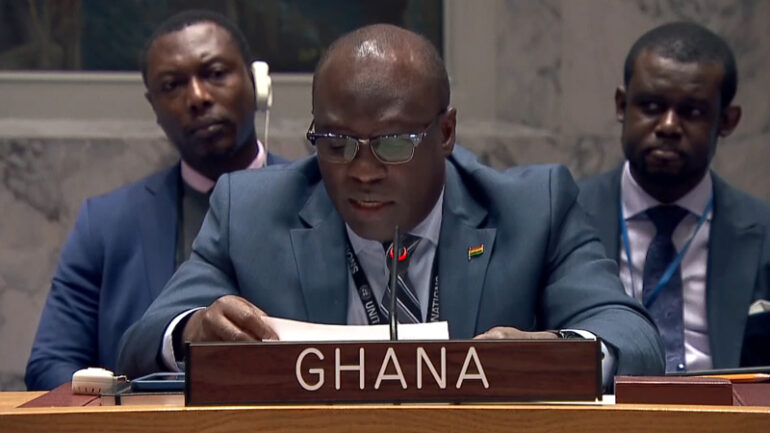UN Security Council Ministerial Debate on Climate and Security in Africa

Mr. President,
I wish to begin by thanking Gabon for convening this high-level debate on Climate and Security in Africa. We welcome the statements of Assistant-Secretary-General Martha Ama Akyaa Pobee and Mr. Tanguy Gahouma-Bekale, former Chair of the Africa Group of Negotiators on Climate Change. We equally thank Mr. Patrick Youssef, ICRC Regional Director for Africa for his additional perspective. As a member of the Group of Friends on Climate and Security, we associate ourselves with the statement to be later read by Germany on behalf of the Group.
Mr. President,
The contentions on the question of climate and security is one that, we believe, has to yield to emerging knowledge of the firm link between the two. As we see from the field, especially on the African continent, the two crises interact. In the Lake Chad region, for instance, where the lake has contracted by 90% from its 1960 size, we are witnessing the
threat multiplier effect of climate change for peace and security including on food and water insecurity, loss of livelihoods, climate induced displacements, and exacerbating vulnerabilities, tensions and conflict. Also, in a 2020 study the ICRC confirmed that of the 25 countries deemed most vulnerable to climate change, 14 were in conflict. Moreover, more than half of the ongoing United Nations peace operations are in countries with the
highest exposure to climate change impact.
Therefore, while there may not be a harmonised view over the degree to which climate change leads to insecurity or whether in situations of conflict climate change hazards are reinforced, we cannot continue to be in disagreement over the notion that in seeking to resolve conflicts, climate risks, where relevant, have to be tackled as part of the peace efforts. As we confront a worsening ecological threat to the continent of Africa and its impact on social and political instability, we must harness available instruments such as the U.N. Framework Convention on Climate Change, and the AU Climate Change and Resilient Development Strategy and Action Plan (2022-2032) to weaken the link between the two crises and abate its escalation into violence.
African States contribute the least increases in global emission of greenhouse gases and yet bear the greatest consequences of climate change. COP 27 in Sharm-El-Sheik in Egypt should therefore be a different COP, a COP where commitments made are translated into action. That would be in our view, a real commitment to breaking the link between the Climate and Security crisis on the African continent.
Mr. President,
In furtherance of the climate and security agenda, we would share three main points.
First, the Security Council should not be prevented from dealing with relevant aspects of the climate question. As we explained earlier, there is sufficient link between the climate and security crises and as the primary organ for maintaining international peace and security, it is important that the Council embrace climate action in the resolution of conflicts where relevant and/or useful to do so. This position of ours is not to suggest that Security Council should engage in norm setting for climate action, but rather that it should not shy away from applying norms universally agreed under the UNFCC.
We therefore encourage the Council to continue with the existing practice of including climate security-specific language in country situation and peacekeeping mission resolutions. This has for instance led to the creation of an Environmental Security Advisor position in the UN Assistance Mission in Somalia (UNSOM). Also, the inclusion of climate security nexus into regionalized UN Mission mandates such as the UN Office for West Africa and the Sahel (UNOWAS) should be extended to other applicable missions in light of the reality of the issue in the region and the continent at large.
Secondly, in dealing with the climate and security agenda, this Council should encourage the strengthening of the capacity of regional and national actors to enhance early warning systems and data analysis capacities which is critical for regional preventive action. In this regard, we note the international support for the Africa Multi-hazard Early Warning and Early Action System (AMHEWAS) Situation Room for disaster risk reduction, and believe that its further strengthening could aid in building capacity to forecast and proactively act on threats and develop resilience to climate-related security risks on the continent.
Thirdly, the Council must enhance its collaborative arrangements with relevant UN entities in the peace-building sector doing commendable work through interventions aimed at addressing climate-related security threats. We are told that the Peace-building Fund (PBF) has since 2017 allocated some $63.4 million for climate security related projects in countries on the Council’s agenda. It is important that we support the Fund to continue on this trajectory, while also encouraging synergies between such interventions and the overall approach to maintaining sustainable peace. In its collaboration with the peacebuilding arm of the United Nations, the Council should also sustain the whole-of-society approach, paying attention to vulnerable groups such as the women and the youth.
Mr. President,
I cannot conclude without mentioning the burning issue of climate financing. While the countries of Africa require about US$2.8 trillion for the period 2020-2030 to implement their Nationally Determined Contributions under the Paris Agreement, the annual climate finance flows in Africa is reported as being less than 5.5% of global climate financing. It is, therefore, important for the international community and donor partners to increase climate financing support to help the continent to adapt address the menace in a sustainable manner.
Ghana believes that climate related security risks are evident in Africa and requires unbridled commitment at the national, regional, and international levels to effectively build resilience towards addressing the situation on the continent.
I thank you!
